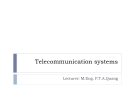
Voice transmission
-
Amplitude distortion: Voice channel occupies the band from 300 to 3400 Hz. Some frequencies are attenuated more than others. Phase distortion Velocity of propagation varies with frequency. Filter: increase toward band center and decrease toward band edge.
 18p
18p  vanmanh1008
vanmanh1008
 24-06-2013
24-06-2013
 64
64
 5
5
 Download
Download
-
Khái niệm . Tích hợp điện thoại số và dịch vụ truyền dữ liệu . số hóa mạng điện thoại để cho phép truyền voice, data, text, graphics, music, video … qua mạng điện thoại sẵn có . Cung cấp dịch vụ ISDN tốc độ cao: image, file transmission, video conferencing …
 15p
15p  peterh18
peterh18
 18-09-2010
18-09-2010
 279
279
 66
66
 Download
Download












